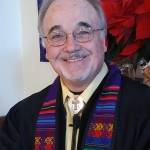Being ‘Christ’ to one another
Reflections on Ephesians 4:25 – 5:2
By Antonio ‘Tony’ Aja

This passage from Ephesians is very appropriate for the times we are living. Let me share some thoughts I picked up from an article written by John Pavlovitz, a well-known Christian activist pastor.
Pavlovitz feels that the current political, cultural and social situation in our country “is creating a generation of displaced adults; people who have found themselves pushed to the periphery in their families, to the breaking point in their marriages, and to estrangement in their friendships and their faith communities. Once easy relationships have become deadly minefields to gingerly navigate; email exchanges and table conversations and social media discussions now fraught with quiet coldness, passive aggressive salvos, or outright disdain.”
He continues, “Every day the exodus continues, the disconnection grows, and the bridges are burned beyond saving — as people realize that they no longer are at home in the places they once belonged, or they no longer want to reside there.”
Unfortunately, I can see this in my own life. I have lost a couple of long-time friendships because of my opposition to the current situation in our country. Some in my own family have distanced themselves from me. Even in my own community of faith, the Christian church at-large, some have chosen the same. Moreover, the Christian church in the United States has taken sides as well.
Many Evangelical churches and mainline Protestant denominations find themselves at opposite sides of the political spectrum, damaging the Christian witness to society. In many congregations some members have stopped going to their churches for the same reasons unfortunately. Both the country and the body of Christ are divided.
That is why these passages in Ephesians are so important for today, as it was back then when divisions within the new church were taking place.
I would like to highlight a few of the principles addressed by the writer. Verse 26 specifically touches me deeply: “Be angry but do not sin; do not let the sun go down on your anger.” I resemble that remark. I am very angry at many of the recent decisions by the current administration, which I believe based on the gospel ideals, are diametrically opposed to the teachings of Jesus Christ and the prophets that speak to our need to be compassionate to the stranger, take care of the poor and disenfranchised, and speak against every type of injustice in our society.
If I am sinning by being angry, I pray every day for God’s forgiveness. In our Reformed tradition we speak about “righteous anger,” which calls us to engage by getting involved. I have done my best to channel my anger by continuing my involvement in advocacy groups for immigration justice and people experiencing homelessness. I write to legislators regularly and participate and speak at rallies and other events protesting the administration’s policies.
Another verse in these passages from Ephesians caught my attention. While doing the exegetical research on the passage, I found that in verse 32 — “…and be kind to one another, tenderhearted, forgiving one another, as God in Christ has forgiven you.” — the word for “kind” is “chrestoi,” a pun on the Greek word for “Christ.”
In other words, the intent of the writer here was to remind the readers the they must “be CHRIST to one another”! I agree, however, that “being Christ” to those who have now agency to bring out of the proverbial closet their hatred, racism, misogyny, xenophobia, homophobia and other phobias and “ism” is very hard. But Christ wants us to love those we may hate as he loved us. He constantly forgave, reached out even to his enemies and paid the ultimate price so that we could have a model to follow.
Would you join on this journey of being Christ to one another, even to those we may hate?

Tony Aja is pastor of Westminster Presbyterian Church in Santa Fe, New Mexico. He is the moderator for the National Hispanic/Latino Presbyterian Caucus and an adjunct professor at McCormick Theological Seminary.